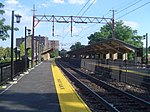Watsessing Avenue station

Watsessing Avenue station (also known as Watsessing) is a New Jersey Transit rail station in Bloomfield, New Jersey, along the Montclair-Boonton Line. It is located beneath the Bloomfield Police Benevolent Association meeting hall (which formerly served as the station building) near the corner of Watsessing Avenue and Orange Street in Bloomfield. It is one of two stations on the line where the boarding platform is below ground level (the Glen Ridge station, two stops away from it, is the other). The Watsessing station and the Kingsland station in Lyndhurst on the Main Line shared similar designs (both station platforms are located below street level) and were built about the same time. The current Glen Ridge, Bloomfield and Watsessing stations along the Montclair branch were all built in 1912 during a grade separation program by the Delaware, Lackawanna and Western Railroad. During New Jersey Transit's running of the line, two stations between Watsessing and Newark Broad Street were closed due to low ridership—the Roseville Avenue station in Newark, at the junction with the Morristown Line on September 16, 1984, and Ampere station in East Orange on April 7, 1991. The word "Watsessing" is a Native American term that translates to "mouth of the creek".The station has been on the New Jersey State Historic Preservation Office listings since March 25, 1998, the last of the four stations from East Orange to Glen Ridge to receive the listing. On September 14, 2005, the entire Montclair Branch was added to the same listings, although Ampere, Bloomfield and Glen Ridge stations have been on the listings since March 17, 1984.
Excerpt from the Wikipedia article Watsessing Avenue station (License: CC BY-SA 3.0, Authors, Images).Watsessing Avenue station
Watsessing Avenue,
Geographical coordinates (GPS) Address Nearby Places Show on map
Geographical coordinates (GPS)
| Latitude | Longitude |
|---|---|
| N 40.7827 ° | E -74.1986 ° |
Address
Watsessing Avenue 9
07003
New Jersey, United States
Open on Google Maps




